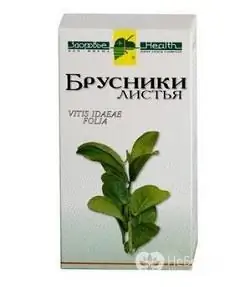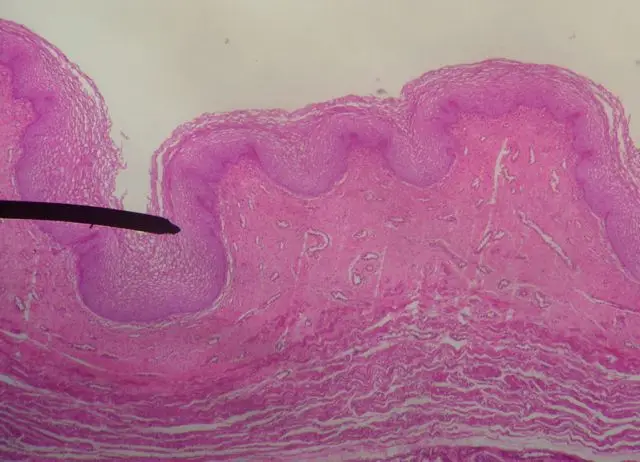- Author Rachel Wainwright wainwright@abchealthonline.com.
- Public 2023-12-15 07:39.
- Last modified 2025-11-02 20:14.
Lingonberry leaves
Instructions for use:
- 1. Useful properties and application in medicine
- 2. Method of preparation and use
- 3. Contraindications to use
Useful properties and application in medicine

Lingonberry leaves have valuable healing properties. The most suitable time for harvesting lingonberry leaves are the periods from April to the beginning of flowering of the plant and in autumn before the onset of cold weather. This natural remedy contains arbutin (a natural antiseptic), antioxidants, tannins (possess astringent properties), tannins, flavonoids (strengthens the walls of capillaries), quinic, ellagic and tartaric acids, vitamin C.
Lingonberry leaf, the use of which is effective in many diseases, has antimicrobial, antiseptic, diuretic, sedative, tonic and cardiotonic properties. Lingonberry leaves are used in the treatment of herpes and flu infections, and are also used as an antiviral agent. The anti-inflammatory properties of lingonberry leaves are due to their high content of benzoic acid.
The use of lingonberry leaf in the form of infusions and decoctions is effective for osteochondrosis, rheumatism, arthritis, and diseases of the gastrointestinal tract. Also, this remedy is useful for diabetics, as it normalizes blood sugar. An important role is played by the use of a decoction of lingonberry leaves for staphylococcal infections.
Lingonberry leaves are used to increase immunity, for any diseases of the bladder and urinary tract, for cholelithiasis, hepatitis, bronchitis and pneumonia. This remedy also helps with diseases of the oral cavity.
Lingonberry leaves can be used during pregnancy to relieve edema, as well as an adjunct in the treatment of diabetes mellitus, nephropathy, pyelonephritis.
Lingonberry leaves, the properties of which make it possible to relieve inflammation and irritation of problem skin, are also used for itching of the head, dandruff, and hair loss.
Method of preparation and use
A decoction, infusion or tea can be prepared from lingonberry leaves.

To prepare the broth, take 2 tablespoons of lingonberry leaves, pour 1 glass of hot water (boiled), and then keep the resulting mixture in an enamel bowl in a water bath for 30 minutes. The broth should be cooled at room temperature for 10 minutes, after which the liquid is filtered and squeezed out of the leaves. By adding water, the resulting broth is brought to 200 ml and stored in the refrigerator for no longer than 2 days. In case of urolithiasis and diseases of the bladder, ½ glass of broth is taken half an hour after meals in a warm form two to three times a day.
A decoction of lingonberry leaves during pregnancy and for the prevention of diseases of the bladder, kidneys is used in the amount of ¼ glass once a day.
In order to prepare the infusion, pour 1 teaspoon of lingonberry leaves with ½ boiling water, leave for 2-3 hours, then strain and squeeze the leaves. With rheumatism, such an infusion is taken every 6 hours for ½ glass, and with gallstone disease - 4-6 times a day, 2 tablespoons. Such an infusion is effective for colds and flu.
To give vivacity, strength, raise tone, mood, strengthen immunity, tea is prepared from lingonberry leaves: 2 tablespoons of raw materials are poured with 1 liter of boiling water and covered with a lid. After 10-15 minutes, the tea is filtered and drunk with the addition of honey 3-4 times a day.
Contraindications for use
Despite the many medicinal properties, the lingonberry leaf has contraindications just like any other remedy.
Infusions and decoctions from lingonberry leaves are not prescribed for children under 12 years old. Caution is necessary when using this drug by patients with increased gastric acidity.
It should be remembered that lingonberry leaves are diuretic and therefore can cause a decrease in pressure. It is not recommended for hypotonic patients to take lingonberry preparations longer than 2-3 weeks. Lingonberry leaf, contraindications due to the content of tannins, is prohibited for people with impaired renal function.
Information about the drug is generalized, provided for informational purposes only and does not replace the official instructions. Self-medication is hazardous to health!






